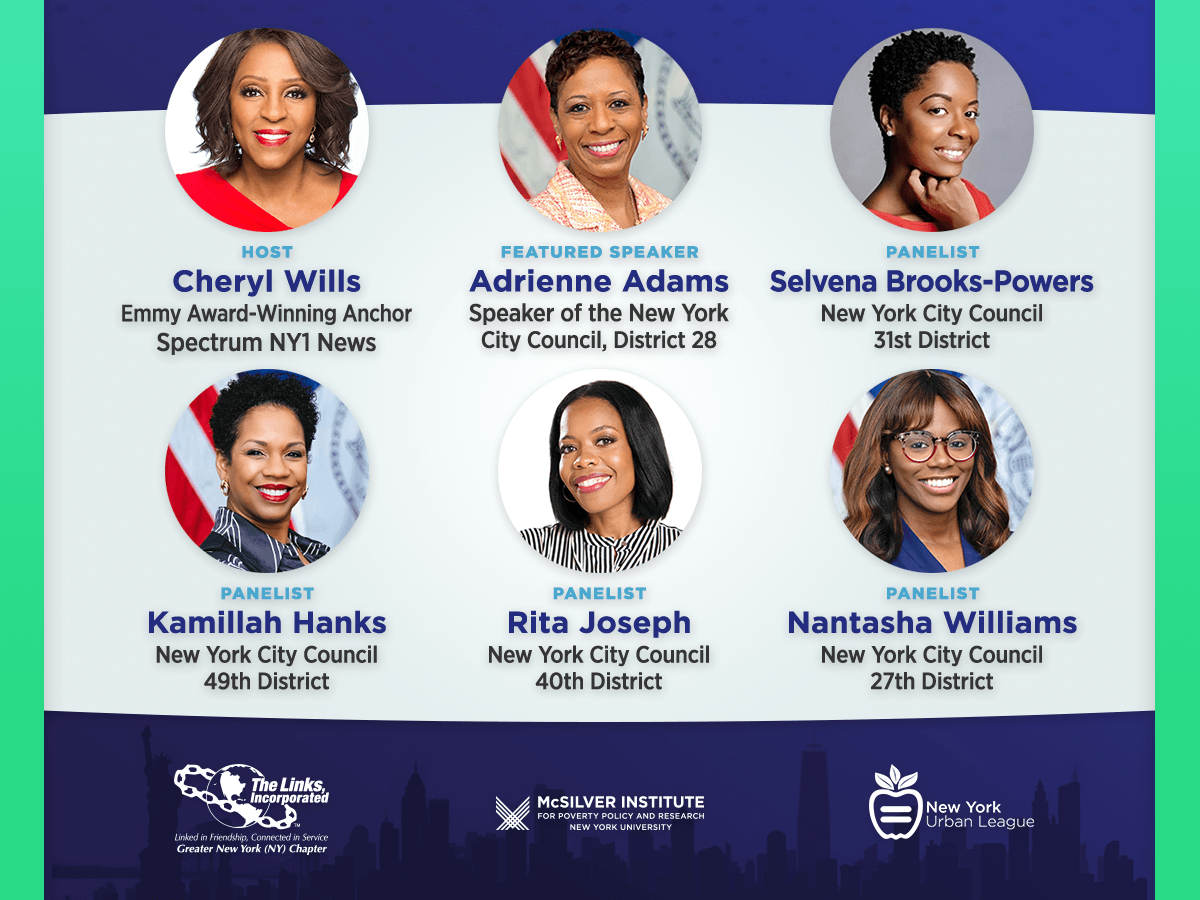NEW YORK, March 16, 2022 — Several Black women who are members of the New York City Council, including its leader, shared their insights yesterday about the historic composition of their governing body, the ongoing quest for gender and racial equity in New York, and what it takes to have a bigger say in what happens in your community. The virtual forum, in observance of Women’s History Month, was part of the “She Leads” series co-hosted by The Greater New York Chapter of the Links, Incorporated (GNY Links), the NYU McSilver Institute and the New York Urban League.
Cheryl Wills, anchor for Spectrum NY1 News, moderated a one-on-one discussion with Adrienne E. Adams, Speaker of the New York City Council, followed by a panel discussion with Council Majority Whip Selvena Brooks-Powers (31st) and Council Members Kamillah Hanks (49th), Rita Joseph (40th) and Nantasha Williams (27th). Opening and closing remarks were made by New York Urban League President and CEO Arva Rice and Dr. Donna Jones, President of the GNY Links.
Video Recording
“It’s worth noting that this [New York] City Council right now has its first-ever female majority and that’s really a hard-fought battle, something all voters should be very proud of,” Wills, as she introduced Speaker Adams. A majority of the Council’s 51 seats are occupied by women, marking a historic shift in the gender balance.
“I am so proud and honored to lead 31 women—a majority of amazing, brilliant women in the New York City County Council, along with the males in the New York City Council as well—but this definitely is ‘herstory.’ It’s our moment,” said Speaker Adams. “It’s taken a while to get here,” she said, noting the trailblazing work of Mary Pinkett, the first Black woman council member and others who came before them. “It takes a lot of stamina. Right now, in the year 2022, we are still fighting. It’s a lot harder for women to make our mark in government than it is for our male counterparts.”
This challenge is true in many arenas of life, and in all of them, women make their mark while being paid less than men. Just one day prior, Speaker Adams had been among the elected officials rallying on the steps of the New York City Hall to mark Equal Pay Day, the point at which women must work into the new year just to make the same amount that their male counterparts did up until New Year’s Eve in the prior year. “We have to get to a place of equity in New York City. It’s something that we’ve got a lot of work to do with. We know that the front-line workers happen to be women of color, those EMS workers, teachers, crossing guards, nurses and the list goes on and on of women who lead and are on the front lines in numbers, but still continue to be at the very end of the pay scale. It’s a shame that we had to stand at the steps of City Hall again to demand, as my colleague Council Member Althea Stevens said, just give us our money.”
New York City law requires employers to post minimum and maximum salary ranges in job listings, but the Council’s Women’s Caucus, which the Speaker leads, are pushing for it, among other pay equality provisions, to happen on a state level. She said, “I think that the time is right for us to do this, and I know that we’ve got the right women in leadership right now to do it.”
Among the topics of focus during the panel discussion was how Black women and other community members can be more involved in decision-making in their localities. Council Member Hanks urged community members of color to get more involved in the local issues that elected officials spend a lot of time on, noting that the few people who typically make their voices heard at the district level have an outsized influence on what gets done. “Many people of color don’t do the boring, mundane things that civics are about. It’s about traffic and potholes and public safety,” she said. “People have to understand that most districts are run by about 30 people who are there every time, every place… so if you are part of a civic association, you tend to understand the bread-and-butter issues that really plague your neighborhood.”
“As an educator I always tell my parents to join the PTA,” echoed Council Member Joseph. “Join the school leadership team, where you get to vote on decisions and budgets and school policies… Join your community board. When you wake up in the morning and you see a bike lane, it didn’t just happen. Your community actually voted on it and you weren’t part of that decision making process. So join it, don’t be afraid.”
“Also, volunteer on campaigns,” Majority Whip Brooks-Powers recommended. “I remember when I went to the Bay Area to work on a campaign. I learned that city so quickly and met people because campaigning allows you to connect with people in a different way and allows you to learn the issues really quickly, in terms of the day-to-day challenges people face. That’s why I have a love for campaigning.”
Council Member Williams concurred with the call for community involvement, and added that elected officials also must do a better job of engaging a broader swath of constituents. “Government itself has to create the space for involvement that is accessible and equitable across the board for folks to be involved.”
